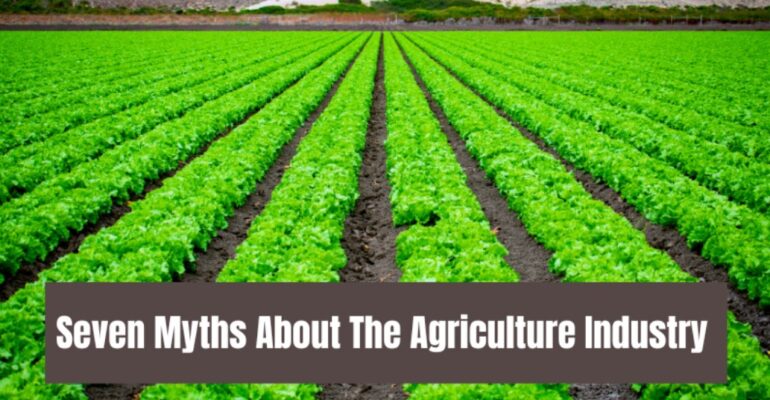Seven Myths About The Agriculture Industry
May 23, 2024 2025-02-21 7:25Seven Myths About The Agriculture Industry

Seven Myths About The Agriculture Industry
Agriculture is one of the oldest industries in the world and is essential for human survival. However, many misconceptions have emerged about agriculture, leading to misunderstandings about the industry and its impact on society. Here are seven common myths about the agriculture industry and the facts that debunk them.
Myth #1: Agriculture is bad for the environment.
Fact: Agriculture has a significant impact on the environment, but it is not entirely negative. Sustainable farming practices such as conservation tillage, crop rotation, and cover cropping can help reduce soil erosion, conserve water, and improve soil health. Additionally, many farmers implement practices that support biodiversity, such as planting pollinator-friendly crops and creating wildlife habitats.
Myth #2: Agriculture is all about large-scale commercial farming.
Fact: While large-scale commercial farming is more commonly associated with agriculture, there are many small-scale farmers and community-based agriculture initiatives. These small-scale farmers play an essential role in supplying fresh produce to local markets, supporting local food economies, and preserving traditional farming practices.
Myth #3: Modern agriculture relies solely on pesticides and fertilizers.
Fact: While the use of pesticides and fertilizers is common in modern agriculture, many farmers are adopting integrated pest management systems that rely on natural predators, crop rotation, and biological controls to reduce the need for synthetic chemicals. Additionally, many farmers are exploring regenerative agriculture practices that focus on building soil health to increase plant resilience and reduce pressure from pests and disease.
Myth #4: Genetically modified organisms (GMOs) are harmful to human health and the environment.
Fact: The safety of genetically modified organisms (GMOs) has been the subject of much debate, but extensive scientific research has shown that GMOs are safe for human consumption and have no negative impact on the environment. GMOs have been used to increase the yield of crops, reduce water usage, and increase nutrient content in food.
Myth #5: Industrial agriculture is the only way to feed the world’s population.
Fact: While industrial agriculture has helped to increase food production and meet the demand of a growing population, small-scale and sustainable farming practices are also essential for food security. Small-scale farmers produce up to 80% of the food in developing countries and play a critical role in supplying fresh produce to local communities.
Myth #6: Farming is a low-tech, low-skill occupation.
Fact: Farming requires a range of skills, from understanding complex scientific concepts such as soil microbiology to advanced machinery operation. Additionally, many farmers are utilizing cutting-edge digital technologies and precision agriculture to increase efficiency, reduce waste, and improve yields.
Myth #7: Farming is a dying industry.
Fact: While farming has certainly faced challenges such as climate change and increasing competition, agriculture remains a vital industry that plays a critical role in society. The industry is expected to grow in the coming years as a result of increased demand for sustainably grown food, new technologies, and changing consumer preferences.
In conclusion, many myths surround the agriculture industry. While the industry does face challenges such as climate change, rural-urban migration, and increasing competition, innovative and sustainable farming practices can help to ensure a bright and sustainable future for agriculture. Policymakers should work with farmers to promote sustainable agriculture practices and support small-scale farmers to increase food security, promote rural development, and preserve traditional farming practices.
Get Free Career Counselling
Related Posts
Search
Categories
Popular Tags





